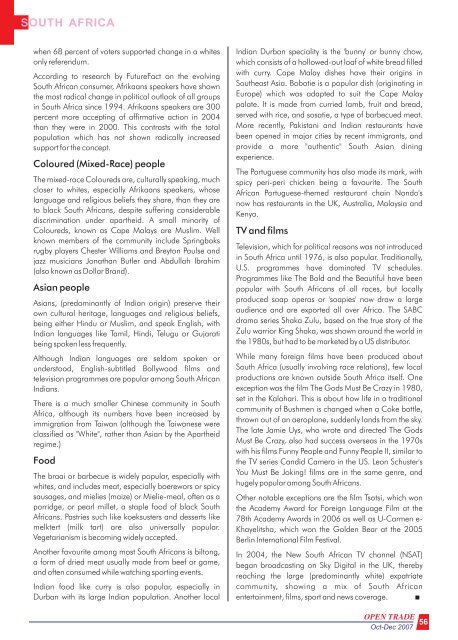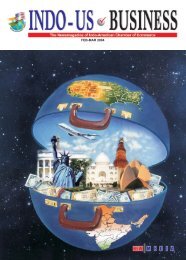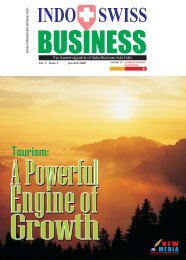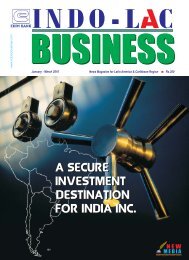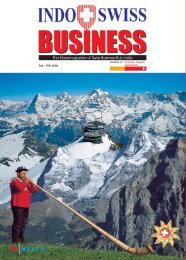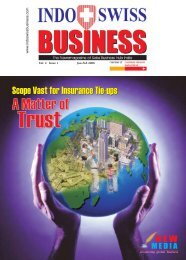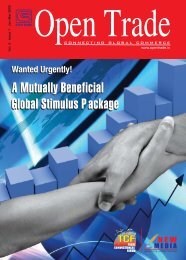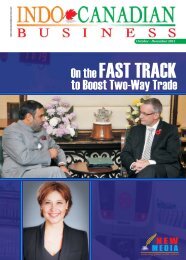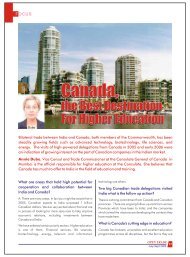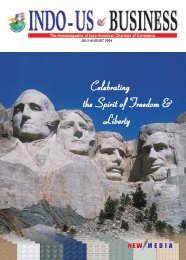pele SciaSction - new media
pele SciaSction - new media
pele SciaSction - new media
Create successful ePaper yourself
Turn your PDF publications into a flip-book with our unique Google optimized e-Paper software.
SOUTH AFRICA<br />
when 68 percent of voters supported change in a whites<br />
only referendum.<br />
According to research by FutureFact on the evolving<br />
South African consumer, Afrikaans speakers have shown<br />
the most radical change in political outlook of all groups<br />
in South Africa since 1994. Afrikaans speakers are 300<br />
percent more accepting of affirmative action in 2004<br />
than they were in 2000. This contrasts with the total<br />
population which has not shown radically increased<br />
support for the concept.<br />
Coloured (Mixed-Race) people<br />
The mixed-race Coloureds are, culturally speaking, much<br />
closer to whites, especially Afrikaans speakers, whose<br />
language and religious beliefs they share, than they are<br />
to black South Africans, despite suffering considerable<br />
discrimination under apartheid. A small minority of<br />
Coloureds, known as Cape Malays are Muslim. Well<br />
known members of the community include Springboks<br />
rugby players Chester Williams and Breyton Paulse and<br />
jazz musicians Jonathan Butler and Abdullah Ibrahim<br />
(also known as Dollar Brand).<br />
Asian people<br />
Asians, (predominantly of Indian origin) preserve their<br />
own cultural heritage, languages and religious beliefs,<br />
being either Hindu or Muslim, and speak English, with<br />
Indian languages like Tamil, Hindi, Telugu or Gujarati<br />
being spoken less frequently.<br />
Although Indian languages are seldom spoken or<br />
understood, English-subtitled Bollywood films and<br />
television programmes are popular among South African<br />
Indians.<br />
There is a much smaller Chinese community in South<br />
Africa, although its numbers have been increased by<br />
immigration from Taiwan (although the Taiwanese were<br />
classified as "White", rather than Asian by the Apartheid<br />
regime.)<br />
Food<br />
Indian Durban speciality is the 'bunny' or bunny chow,<br />
which consists of a hollowed-out loaf of white bread filled<br />
with curry. Cape Malay dishes have their origins in<br />
Southeast Asia. Bobotie is a popular dish (originating in<br />
Europe) which was adapted to suit the Cape Malay<br />
palate. It is made from curried lamb, fruit and bread,<br />
served with rice, and sosatie, a type of barbecued meat.<br />
More recently, Pakistani and Indian restaurants have<br />
been opened in major cities by recent immigrants, and<br />
provide a more "authentic" South Asian dining<br />
experience.<br />
The Portuguese community has also made its mark, with<br />
spicy peri-peri chicken being a favourite. The South<br />
African Portuguese-themed restaurant chain Nando's<br />
now has restaurants in the UK, Australia, Malaysia and<br />
Kenya.<br />
TV and films<br />
Television, which for political reasons was not introduced<br />
in South Africa until 1976, is also popular. Traditionally,<br />
U.S. programmes have dominated TV schedules.<br />
Programmes like The Bold and the Beautiful have been<br />
popular with South Africans of all races, but locally<br />
produced soap operas or 'soapies' now draw a large<br />
audience and are exported all over Africa. The SABC<br />
drama series Shaka Zulu, based on the true story of the<br />
Zulu warrior King Shaka, was shown around the world in<br />
the 1980s, but had to be marketed by a US distributor.<br />
While many foreign films have been produced about<br />
South Africa (usually involving race relations), few local<br />
productions are known outside South Africa itself. One<br />
exception was the film The Gods Must Be Crazy in 1980,<br />
set in the Kalahari. This is about how life in a traditional<br />
community of Bushmen is changed when a Coke bottle,<br />
thrown out of an aeroplane, suddenly lands from the sky.<br />
The late Jamie Uys, who wrote and directed The Gods<br />
Must Be Crazy, also had success overseas in the 1970s<br />
with his films Funny People and Funny People II, similar to<br />
the TV series Candid Camera in the US. Leon Schuster's<br />
You Must Be Joking! films are in the same genre, and<br />
hugely popular among South Africans.<br />
The braai or barbecue is widely popular, especially with<br />
whites, and includes meat, especially boerewors or spicy<br />
sausages, and mielies (maize) or Mielie-meal, often as a Other notable exceptions are the film Tsotsi, which won<br />
porridge, or pearl millet, a staple food of black South the Academy Award for Foreign Language Film at the<br />
Africans. Pastries such like koeksusters and desserts like 78th Academy Awards in 2006 as well as U-Carmen e-<br />
melktert (milk tart) are also universally popular. Khayelitsha, which won the Golden Bear at the 2005<br />
Vegetarianism is becoming widely accepted.<br />
Berlin International Film Festival.<br />
Another favourite among most South Africans is biltong, In 2004, the New South African TV channel (NSAT)<br />
a form of dried meat usually made from beef or game,<br />
began broadcasting on Sky Digital in the UK, thereby<br />
and often consumed while watching sporting events.<br />
reaching the large (predominantly white) expatriate<br />
Indian food like curry is also popular, especially in community, showing a mix of South African<br />
Durban with its large Indian population. Another local entertainment, films, sport and <strong>new</strong>s coverage. <br />
OPEN TRADE 56<br />
Oct-Dec 2007


